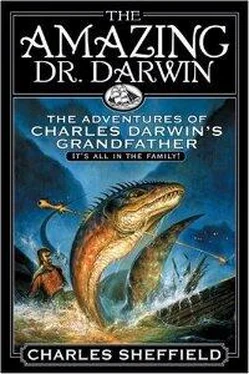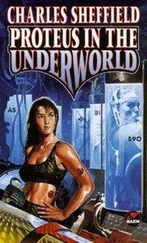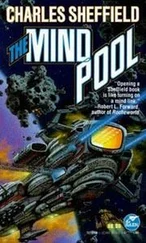“I won’t get off on the issue of religious beliefs,” said Darwin calmly. “The proof that I have in mind is much more tangible, and much more easily tested. It is this: a being is human if and only if it can mate with a known human, and produce offspring. Now, having seen the fiends, isn’t it obvious to you, Jacob, and to you, Anna, that Jimmy was sired by one of them? One of them impregnated daft Molly Metcalf, up on the fell.”
Anna Thaxton and Jacob Pole looked at each other. Jacob nodded, and Anna bit her lip. “He’s quite right, Richard,” she said. “Now I think about it, Jimmy looks just like a cross of a human with a fiend. Not only that, he knows his way perfectly through all the tunnels, and seems quite comfortable there.”
“So, my first point is made,” said Darwin. “The fiends are basically human, though they are a variation on our usual human form—more different, perhaps, than a Chinaman, but not much more so.”
“But how could they exist?” asked Thaxton. “Unless they were created as one of the original races of man?”
“I don’t know if there really were any ‘original races of man.’ To my mind, all animal forms develop and change, as their needs change. There is a continuous succession of small changes, produced I know not how—perhaps by the changes to their surroundings. The beasts we finally see are the result of this long succession—and that includes Man.”
Darwin sat back and picked up his pie for a second attack. Pole, who had heard much the same thing several times before, seemed unmoved, but Anna and Richard were clearly uncomfortable with Darwin’s statements.
“You realize,” said Thaxton cautiously, “that your statements are at variance with all the teachings of the Church—and with the words of the Bible?”
“I do,” said Darwin indistinctly, through a mouth crammed full of pie. He held out his mug for a refill of the spiced wine.
“But what of your other assertion, Erasmus?” said Pole. “If the fiends were not on Cross Fell for the past fifteen hundred years, then where the devil were they? And what were they doing?”
Darwin sighed. He was torn between his love of food and his fondness for exposition. “You didn’t listen to me properly, Jacob. I never said they weren’t about Cross Fell. I said they weren’t living in the mine tunnels for fifteen hundred years.”
“Then where were they?” asked Anna.
“Why, living on the surface—mainly, I suspect, in the woods. Their murals showed many forest scenes. Perhaps they were in Milburn Forest, southeast of Cross Fell. Think, now, there have been legends of wood-folk in England as long as history has records. Puck, Robin Goodfellow, the dryads—the stories have many forms, and they are very widespread.”
“But if they lived in the woods,” said Anna, “why would they move to the mine tunnels? And when did they do it?”
“When? I don’t know exactly,” said Darwin. “But I would imagine that it was when we began to clear the forests of England, just a few hundred years ago. We began to destroy their homes.”
“Wouldn’t they have resisted, if that were true?” asked Pole.
“If they were really fiends, they might—or if they were like us. But I believe that they are a very peaceful people. You saw how gentle they were with us, how they cared for us when we were sick—even though we must have frightened them at least as much as they disturbed us. We were the aggressors. We drove them to live in the disused mines.”
“Surely they do not propose to live there forever?” asked Anna. “Should they not be helped, and brought forth to live normally?”
Darwin shook his head. “Beware the missionary spirit, my dear. They want to be allowed to live their own lives. In any case, I do not believe they would survive if they tried to mingle with us. They are already a losing race, dwindling in numbers.”
“How do you know?” asked Pole.
Darwin shrugged. “Partly guesswork, I must admit. But if they could not compete with us before, they will inevitably lose again in the battle for living space. I told you on the fell, Jacob, in all of Nature the weaker dwindle in number, and the strong flourish. There is some kind of selection of the strongest, that goes on all the time.”
“But that cannot be so,” said Thaxton. “There has not been enough time since the world began, for the process you describe to significantly alter the balance of the natural proportions of animals. According to Bishop Ussher, this world began only four thousand and four years before the birth of Our Lord.”
Darwin sighed. “Aye, I’m familiar with the bishop’s theory. But if he’d ever lifted his head for a moment, and looked at Nature, he’d have realized that he was talking through his episcopal hat. Why, man, you have only to go and look at the waterfall at High Force, not thirty miles from here, and you will realize that it must have taken tens of thousands of years, at the very least, to carve its course through the rock. The earth we live on is old—despite the good bishop’s pronouncement.”
Anna struggled to her feet and went over to look out of the window. It was still foggy and bleak, and the fell was barely visible through the mist. “So they are humans, out there,” she said. “I hope, then, that they have some happiness in life, living in the cold and the dark.”
“I think they do,” said Darwin. “They were dancing when first we saw them, and they did not appear unhappy. And they do come out, at night, when the fell is shrouded in mist—to steal a few sheep of yours, I’m afraid. They always return before first light. They fear the aggressive instincts of the rest of us, in the world outside.”
“What should we do about them?” asked Anna.
“Leave them alone, to live their own lives,” replied Darwin. “I already made that promise to the red fiend, when we began to exchange medical information. He wanted an assurance from us that we would not trouble them, and I gave it. In return, he gave me a treasure-house of botanical facts about the plants that grow on the high fells—if I can but remember it here, until I have opportunity to write it down.” He tapped his head.
Anna returned from the window. She sat down again and sighed. “They deserve their peace,” she said. “From now on, if there are lights and cries on the fell at night, I will have the sense to ignore them. If they want peace, they will have it.”
* * *
“So, Erasmus, I’ve been away again chasing another false scent. Damn it, I wish that Thomas of Appleby were alive and here, so I could choke him. All that nonsense about the Treasure of Odirex—and we found nothing.”
Pole and Darwin were sitting in the coach, warmly wrapped against the cold. Outside, a light snow was falling as they wound their way slowly down the Tees valley, heading east for the coastal plains that would take them south again to Lichfield. It was three days before Christmas, and Anna Thaxton had packed them an enormous hamper of food and drink to sustain them on their journey. Darwin had opened it, and was happily exploring the contents.
“I could have told you from the beginning,” he said, “that the treasure would have to be something special to please Odirex. Ask yourself, what sort of treasure would please the King of Hate? Why was he called the King of Hate?”
“Damned if I know. All I care about is that there was nothing there. If there ever was a treasure, it must have been rifled years ago.”
Darwin paused, a chicken in one hand and a Christmas pudding in the other. He looked from one to the other, unable to make up his mind.
“You’re wrong, Jacob,” he said. “The treasure was there. You saw it for yourself, and I had even closer contact with it. Don’t you see, the fiends themselves are the Treasure of Odirex . Or rather, it is what they bear with them that is the Treasure.”
Читать дальше












